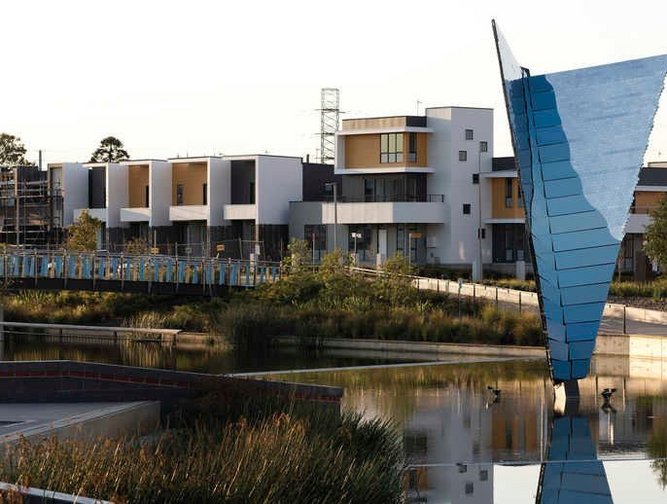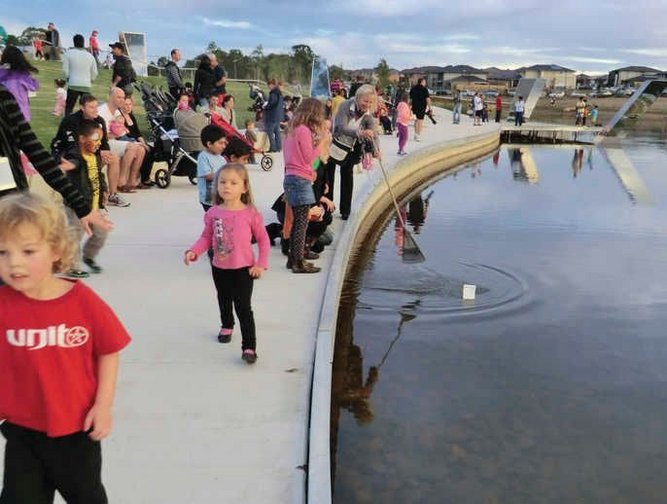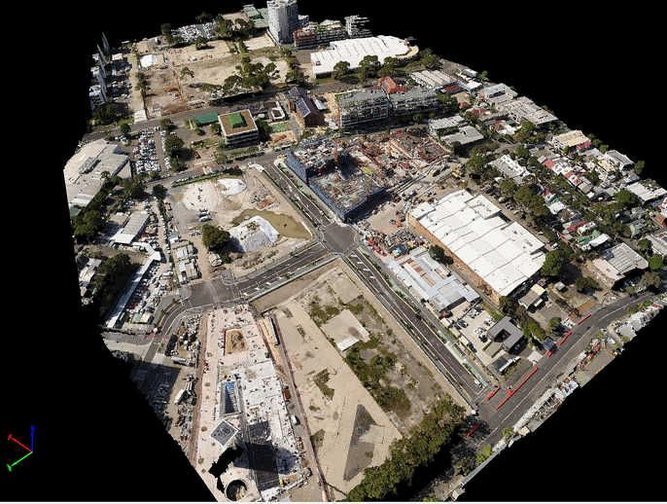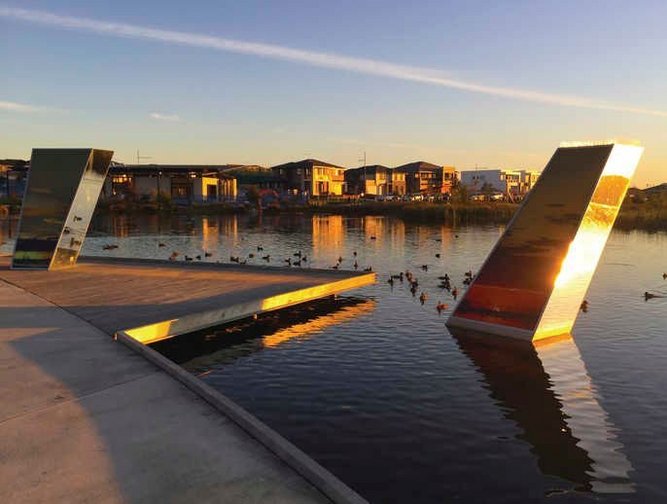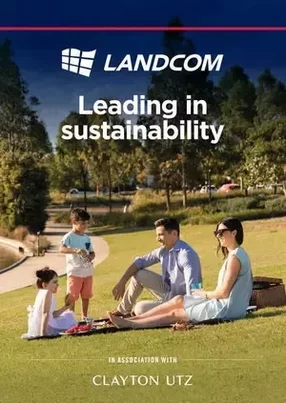Across the world, organisations are waking up to the necessity of implementing comprehensive sustainability strategies and the wide-ranging benefits that ensue. Landcom, a land and property development organisation of the government of New South Wales, Australia, can trace its sustainability journey to its first sustainability strategy developed in 2002. Its growing prominence as a sustainability leader is now underpinned by its Sustainable Places Strategy launched in 2017. Lauren Kajewski, Director of Sustainability & Learning, has been with the company for three years. In that time, Kajewski has been pivotal in driving Landcom’s sustainability efforts, implementing a strategy that emphasises transparency, clear targeting and community engagement, among other factors.
Targets
Landcom’s Sustainable Places Strategy is centred around four pillars, each with associated targets to measure performance. The first, Climate Resilient Places, is based around delivering low carbon communities that balance ecological outcomes, reduce climate related stresses and build community resilience. Healthy & Inclusive Places has the objective of delivering communities founded on equity, affordability and inclusion. The Productive Places pillar has the goal of enabling more than 30,000 jobs by 2036, while Accountable & Collaborative Places reflects Landcom’s commitment to governance and collaboration, both within its own organisation and across the wider supply chain.
It is clear from its goals that Landcom has an inclusive definition of sustainability, one that extends beyond its organisational practices to the communities in which it operates. All targets are detailed in admirable depth online in the company's sustainability reports, with specific markers of yearly progress. “Get people on the journey with you so that they can be involved and share in the benefits,” says Kajewski. “We embrace that internally, and use our IAP2 aligned Join-In Framework to engage our community members so they can be part of positive change ”
Landcom’s sustainability strategy is not founded in a vacuum; it is informed by extensive research and consultation, interacting with the broader spectrum of sustainability. For instance, the strategy aligns with international frameworks including the United Nations’ Paris Agreement, with a commitment to carbon neutral communities by 2028, and the Sustainable Development Goals (SDGs). Consequently, as well as reporting on its own goals, the company publishes its contribution to the SDGs, highlighting the specific ways in which the two overlap.
“The millennium goals were an incredible success,” says Kajewski. “We haven't yet realised that with the SDGs. They represent a call to business, organisations and civil society to contribute in any way we can. That's why we founded our Sustainable Places Strategy on the SDGs and are reporting against them. We aim to be transparent in what we think we are contributing and how we can make an impact.”
The willingness of Landcom to lead by example sent it to fourth place worldwide in the 2018 Global Real Estate Sustainability Benchmark (GRESB) Developer Assessment, up from seventh in 2017. Kajewski sees healthy competition as a booster for the progress of sustainability, saying: “GRESB has been our first foray into using sustainability competitively, and it has really resounded within the organisation. Staff are looking at sustainability differently. That made it a real advantage for our team.” Sustainability is often thought of as an extra over and a cost to an organisation,” says Kajewski. “However, our CFO talks about the business value created by sustainability.”
Community
Landcom’s Pillars and their targets are all intensely interrelated, as Kajewski explains. “Our Climate Resilient Places pillar focuses on mitigating the impacts of climate change at all of our communities. This includes collaborating with the people living there. When we implement resilience and adaptation plans they are very people-focused, which connects into Healthy & Inclusive Places. Here we have a strong focus on liveability. Interestingly, residents tell us the most important urban design elements to them are access to green open space and canopy cover, which loops us back to how we mitigate the effects of climate change, such as reducing urban heat island — part of Climate Resilient Places.”
This sense of things building from, and feeding into, one another is evident throughout Landcom’s approach to sustainability. When she was hired, Kajewski brought her experience of sustainability in the private sector to Landcom. “Landcom has a strong legacy in sustainability, but we weren't thinking of it as a competitive advantage to our business, which is exactly how the private sector uses it,” says Kajewski. “The call for a refocus on sustainability originally came from our Board who wanted us to have ‘a world class sustainability strategy’. It became my job to deliver that.”
So too does the drive to extend Landcom’s commitments reach into their work with other developers and construction companies. Kajewski details how Landcom has partnered with Clayton Utz, a leading Australian law firm, to develop a rigorous approach of filtering sustainability into their contracts and asset divestment. “Even when we divest an asset we still require a developer to achieve sustainability outcomes. Clayton Utz helped us to set very clear goals up front, and then use a range of mechanisms to ensure these ambitions are achieved. They have helped us position this strategically within the market – again we use sustainability as a competitive advantage. There aren’t prolific mandatory requirements, but clearly articulated outcomes we want achieved. This flexibility is essential, and fosters market innovation.”
Eugene Tan, Special Counsel at Clayton Utz, further details the relationship with Landcom and the work they do together to advance the cause of sustainability. “Working with [Lauren and] the team at Landcom is always a great experience due to the combination of their vision and their readiness to challenge business-as-usual practices in order to return deeper value from their projects — a mindset which is reflected throughout the organisation, from the Board through to the project teams. This commitment to innovating beyond the norm and building a new and better standard is something which Landcom and Clayton Utz share a passion for. Together — with the clarity of Landcom's vision and without the constraints of precedent — we have created a new contracting framework in which the value of sustainability is an inherent commercial factor in all of Landcom's dealings; providing a more comprehensive basis for evaluating the overall value returned to the State, driving competition within the private sector to deliver higher quality urban environments and creating places which are focussed on the people of NSW. We are proud to be part of Landcom's ground-breaking sustainability journey and its transformation of NSW.”
In the end, Kajewski sees the sustainability work of Landcom as contributing towards, and drawing from, the ever-growing body of sustainability knowledge. “As a State Owned Corporation, part of our role is to lead by example. The sustainability world is small and those of us in it are highly collaborative. We're very happy to share knowledge and pull together to make a difference.”
Reporting
“The lens I always end up using is that my mum needs to understand what we do and what we achieved in a year,” says Kajewski. “If she can't, I've got a problem.” Consequently, Landcom has worked with Sydney design agency Walterwakefield to move away from huge, dense yearly reports. The goal is to make Landcom’s sustainability performance results accessible, tangible and easily digestible. “That’s what Walterwakefield have helped us achieve. Our website is now our one source of truth, is highly interactive and preferences infographics and visual communications over text heavy reports. Ultimately we want people to engage with what we are doing – and in a digital age that means having an excellent online presence”.
"At our core, we communicate complex information, simply,” says Jaimy Walter, Managing Partner and Creative Director at Walterwakefield. We work with our clients to understand their business strategy implicitly, then employ our visual arsenal to deliver these key messages as effectively as possible. Be that through applying logic, clever use of data, or enhancing the message through the use of pictures, infographics or video creation. Whatever most effectively communicates the concept and creates impact." This transparent publication of data is cited by Kajewski as important in inspiring others to help contribute towards sustainability within the industry and civil society at large.
Of course, it is undoubtedly the case that you can only report on what you know, and Landcom’s data collection efforts are crucial to gathering knowledge on progress towards its goals. “We have a very comprehensive sustainability platform that soaks up data, often in real time,” says Kajewski. “Then, that is synthesised into clear dashboards so we can get a nice clean picture of where things are at.”
Landcom’s data collection efforts are continuously expanding along with the scope of their targets, and consequently Kajewski notes that care must be taken to avoid becoming swamped by irrelevant items. Through cleverly targeted collection, Landcom can give their communities the information that they care about, with Kajewski giving the example of results from their Healthy & Inclusive Places Survey, that measures satisfaction with quality of life – the results of which are then shared back to participants.
What does the future hold for Landcom? In Australia’s current property market, Kajewski sees the opportunity to leverage Landcom’s strong sustainability focus. “We've recently launched sustainability home rebates in the market,” says Kajewski. “If a homeowner designs and delivers their home to a prescribed standard, which we have set to just shy of a carbon neutral home, then we'll pay you back what you have invested, up to $15,000.” Such schemes allow the company to achieve sustainability outcomes in circumstances it previously wouldn’t have been able to influence.
Innovations such as these have helped to put Landcom back on the sustainability map, a development that Kajewski credits to efforts across the company. “We've managed to drive our current strategy fast. That’s been due to some really strong collaboration between project teams and my team, and also having support from our CEO, Executives and the Board.” Confidence in the role of sustainability, in both a business and social sense, has filtered through the company to become a serious consideration at every level. “I'm proud of how our organisation was able to rally and move really swiftly,” says Kajewski. “That feels like quite an achievement for us, and it's only going to improve from here.”
